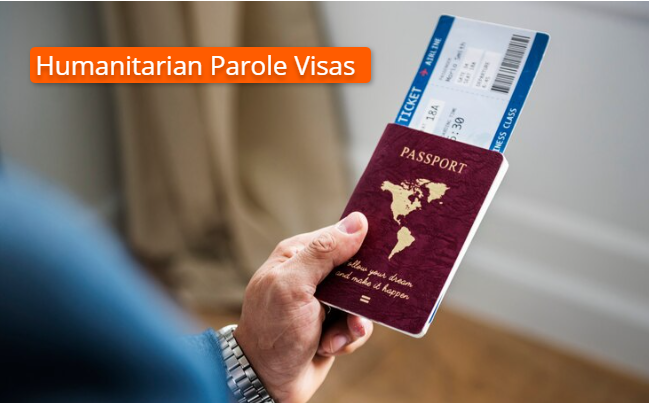What Are Humanitarian Parole Visas? A Detailed Guide

Introduction
A humanitarian parole visa is a special immigration relief granted by the U.S. Citizenship and Immigration Services (USCIS) that allows individuals facing emergencies to enter the United States for humanitarian reasons or significant public benefit. It is a temporary measure used only when no other visa options are available.
People seek humanitarian parole for various reasons, including:
- Medical emergencies requiring life-saving treatment in the U.S.
- Family reunification in cases of extreme hardship
- Protection from life-threatening conditions in the home country
- Participation in legal proceedings for significant public interest
Unlike traditional visas, a humanitarian parole visa is not a pathway to permanent residency. However, some individuals may explore humanitarian parole adjustment of status if they become eligible for other immigration benefits.
What Is a Humanitarian Parole Visa?
In U.S. immigration, parole refers to temporary permission for foreign nationals to enter the country without being formally admitted. Section 212(d)(5) of the Immigration and Nationality Act (INA) allows for humanitarian parole when an individual faces urgent humanitarian reasons or a significant public interest case.
Key Differences Between Humanitarian Parole & Other Visas
| Visa Type | Purpose | Eligibility | Path to Green Card? |
| Tourist Visa (B1/B2) | Travel, tourism, business | Open to most applicants | No |
| Work Visa (H-1B, L-1, etc.) | Employment in the U.S. | Employer sponsorship required | Possible |
| Family-Based Visa | Family reunification | Must have a U.S. citizen or resident relative | Yes |
| Humanitarian Parole Visa | Temporary entry for emergencies | Only for urgent humanitarian reasons | No |
Unlike other visas, humanitarian parole is only granted in rare cases when all other options have been exhausted.
Eligibility for a Humanitarian Parole Visa
Not everyone qualifies for humanitarian parole. USCIS approves these requests on a case-by-case basis.
Who Qualifies for Humanitarian Parole?
- Individuals in Medical Emergencies – Those needing immediate medical care are unavailable in their home country.
- Families Facing Hardship – Parents, spouses, or children of U.S. citizens facing severe circumstances.
- People in Danger – Those fleeing war, persecution, or unsafe conditions in their home country.
- Legal Participants – Individuals needed for court cases, testimony, or public benefit purposes.
Who Does Not Qualify?

- Those who already qualify for a standard visa (B1/B2, F-1, H-1B, etc.).
- People applying for employment purposes unless the case has a humanitarian basis.
- Applicants without strong supporting evidence of their urgent need.
How to Apply for a Humanitarian Parole Visa (Step-by-Step Guide)
Step 1: Gather Required Forms & Documents
Your humanitarian parole application must include:
- Form I-131 – Application for Travel Document (application for humanitarian parole)
- Form I-134 – Affidavit of Support (humanitarian parole sponsor)
- Supporting Evidence – Medical reports, police reports, legal documents, etc.
- Urgent humanitarian reasons letter – A detailed letter explaining the reason for your request.
Tip: If applying for medical reasons, provide a letter from a U.S. doctor confirming your treatment needs.
Step 2: Pay the Fees
- Standard Fee – $575 for Form I-131
- Fee Waivers – Available for applicants proving financial hardship
Step 3: Submit the Application
Send your parole application along with all required forms and supporting documents to the USCIS Humanitarian Affairs Office.
Processing Time: Typically 90 to 120 days, but cases with emergency advance parole reasons may be expedited.
Tip: If applying under Haitian parole program benefits or Venezuelan parole processing time, check USCIS for specific updates.
Benefits & Limitations
Benefits of Humanitarian Parole
- Temporary Stay in the U.S. for emergencies
- Possibility of obtaining a humanitarian parole work permit
- May qualify for humanitarian parole adjustment of status if another visa pathway opens
Limitations

- No guarantee of permanent residency
- Strict travel restrictions – parolees cannot freely travel in and out of the U.S.
- High rejection rates – only granted in extraordinary cases
How Long Does Humanitarian Parole Last?
A humanitarian parole visa is usually granted for a specific period, often between one to two years, depending on the urgency of the case. However, it does not provide a permanent immigration status.
Once your parole period expires, you must either:
- Leave the United States before the expiration date.
- Apply for an extension if your emergency still exists.
- Seek a different legal pathway to stay in the U.S., such as applying for asylum or adjusting status through a family-based petition.
Important: There is no automatic renewal of humanitarian parole. If your situation still qualifies as urgent, you must submit a new humanitarian parole application before your existing parole expires.
Can You Work on a Humanitarian Parole Visa?
Yes, in some cases, a humanitarian parole work permit (also known as an Employment Authorization Document, EAD) can be granted. To apply for work authorization:
- Submit Form I-765 (Application for Employment Authorization) to USCIS.
- Provide proof of your humanitarian parole approval.
- Show evidence that you need to work to support yourself.
Processing Time: It may take 90 to 150 days for USCIS to process work permit applications.
Can a Humanitarian Parolee Apply for a Green Card?
A humanitarian parole visa does not automatically lead to a green card. However, under certain conditions, parolees may be eligible to adjust their status through:
- Family-Based Immigration – If a U.S. citizen or lawful permanent resident sponsors them.
- Employment-Based Visa – If an employer petitions for them.
- Asylum or Refugee Status – If they qualify for protection under U.S. law.
- Special Programs – Some nationalities may be eligible under specific humanitarian initiatives, such as Haitian parole program benefits.
Key Consideration: Before applying for a green card, check whether you qualify under the humanitarian parole adjustment of status policies or speak to an immigration attorney.
How to Strengthen Your Humanitarian Parole Application?
Due to high denial rates, you must submit a strong application with the following:
- Humanitarian reasons for parole are clearly explained in a detailed letter.
- A sample humanitarian parole request outlining the urgency of the situation.
- A well-prepared urgent humanitarian reasons letter from a doctor, lawyer, or relief organization.
- A qualified humanitarian parole sponsor meeting USCIS’s financial and legal requirements.
Challenges & Common Issues

High Denial Rates
USCIS approves only a small percentage of cases due to strict criteria. To improve your chances:
- Submit a sample humanitarian parole request with clear documentation.
- Provide strong evidence (medical, legal, financial).
- Ensure your humanitarian parole sponsor meets financial obligations.
Alternative Options If Denied
- Reapply or Appeal – Submit additional evidence addressing the reasons for the denial.
- Consider Other Visa Options – Such as the visa humanitarian USA or asylum.
What Happens After Approval (or Denial)?
If Approved:
- Receive Form I-512 – Authorization to enter the U.S.
- Stay up to the approved parole duration.
- Apply for a humanitarian parole work permit if eligible.
If Denied:
- You must leave the U.S. unless another legal option is available.
- Consult an immigration lawyer to explore other possibilities.
Conclusion
A humanitarian parole visa offers temporary relief for individuals facing urgent crises, but the process is complex and requires strong documentation. Understanding eligibility, application steps, and sponsor requirements is key to increasing approval chances. If denied, exploring alternative immigration pathways is essential. For expert guidance, consult an immigration attorney to ensure the best possible outcome.
Need Help With Your Immigration Case?
If you’re applying for a humanitarian parole visa, getting legal guidance can improve your chances of success.
